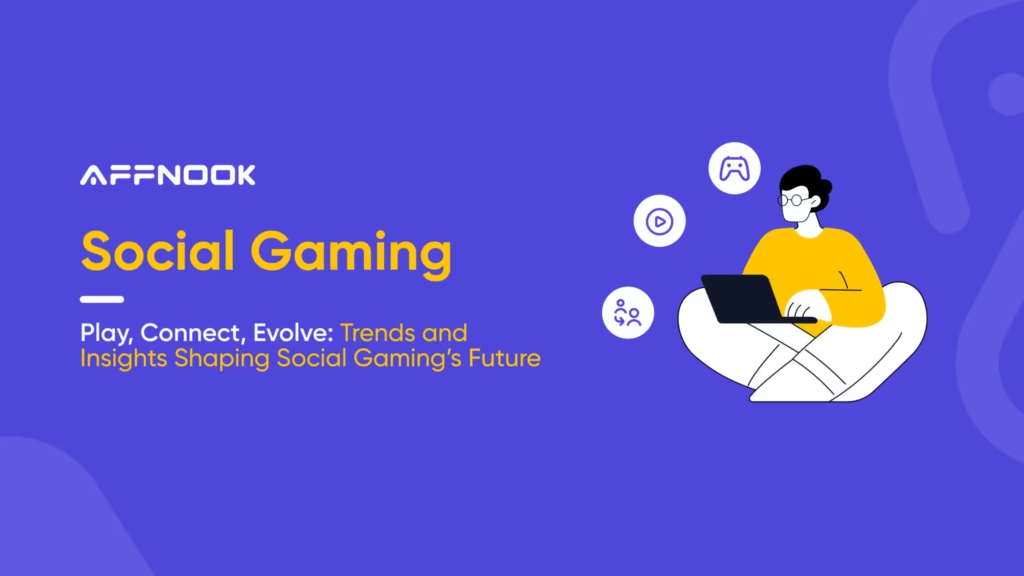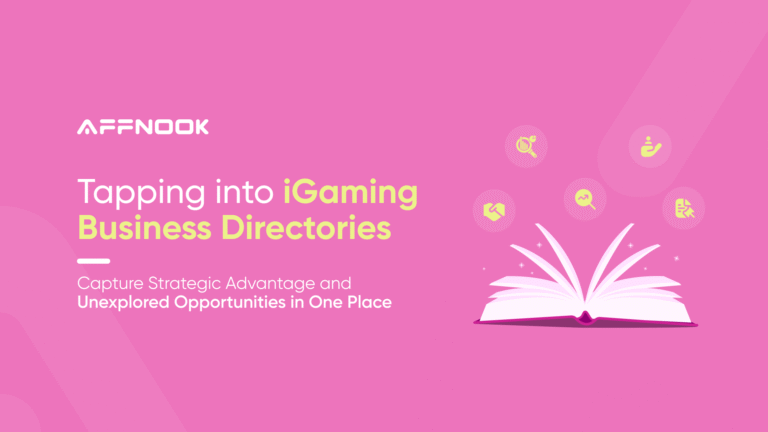Have you ever wondered why social gaming has become so popular worldwide? Social gaming is very popular worldwide because it attracts and engages a number of players from all over the world. Social gaming is a combination of interactive gameplay and social interaction. These games merge traditional techniques like real-time interaction and collaboration among players.
The social gaming market is expected to continue its impressive growth, driven by increasing internet connectivity, a surge in mobile gaming, and the rise of immersive multiplayer experiences. Market size reached USD 35.60 billion in 2024 and is on track to touch USD 71.13 billion by 2030, posting a 14.85% CAGR over 2025-2030.
What is social gaming?
Social gaming refers to games that contain features that encourage social interaction among players. These games facilitate players to connect, communicate, and compete in the virtual world, as they largely exist on social media platforms. In addition, they provide integration, like messaging, leadership, and other elements for engagement. You can play these games on many digital platforms like Facebook, Instagram, and other mobile gaming applications.
For example, If we talk about casual mobile games like Candy Crush or large-scale games like World of Warcraft. These games encourage players to engage and participate in their communities. There are many social games in which you win rewards in the form of real money. Social games connect games and social networks for more engagement. As a result, you can even expand your social connections.
Key Characteristics of Social Gaming
Here are some key characteristics of social gaming:
- Multiplayer Experience: Social games allow players to participate and interact with multiple other players at the same time. While playing games, they feel a unique experience. This real-time gameplay creates adventurous games that engage the player for a longer time.
Example: PUBG allows players to connect, enhancing their gameplay experience. This not only helps foster stronger bonds among teammates but also increases the chances of winning.
- Cross-Platform Accessibility: Games are available on many social gaming platforms, which help players to interact and play nonstop, without any interruption, on different iGaming platforms. Players can choose any device, like a laptop, mobile phone, or computer, to play a game seamlessly, which enhances the social nature.
- In-Game Purchases and Virtual Goods: This feature gives players a sense of having a unique character, which keeps them more engaged and encourages them to keep playing. It also allows them to buy virtual items, like costumes and in-game currency, which improves their overall gaming experience.
- Free-to-Play Model: This model helps players download and enjoy the game by spending zero money. Many popular games like Candy Crush use this metric to attract and engage a large audience. This idea is very simple. Players can play the games for free and provide other ways to spend the money in-game, like for extra chances or to buy anything in the game for a better experience.
The Economics of Social Gaming
The economics of social gaming are built on a combination of monetization models, player engagement strategies, and the evolving landscape of mobile and online gaming. Here’s a breakdown of how social gaming generates revenue and sustains its growth.
1. Free-to-Play but Pay-to-Enhance
Many social games are free to download and play. But if you want to enhance your experience with more features you have to pay and buy extra items like coins, skin, outfits, and power up your characters. For example, in the game Temple Run, you can play for free but you have to pay for extra chances or unlock extra items to power up characters.
2. Ads that Work for Everyone
In many social games, we watch ads to make in-game currency or to get an extra chance to play. These ads give you free live and game bonuses. With this option, both players and developers benefit. Players get rewards and developers earn revenue from advertisers for each in-game ad play.
3. Social Casinos: Gaming meets Gambling
Social casinos are a special type of game. Games like Zynga Poker let players enjoy casino-like fun without using real money. Instead of betting money, players buy virtual chips to play. This makes it feel like a real casino but there is no risk involved. Even though they are fun, some people argue that these games are too similar to real gambling.
4. E-sports and Competitive Play
Millions of fans watch players participate in tournaments held by Fortnite. Through sponsorships, advertisements, and products, these events generate revenue, turning gaming into a worldwide spectacle that makes money for everyone involved.
Current Trends in Social Gaming
The social gaming world is changing very rapidly and connecting players through games. Social gaming has become a core component of modern culture that provides fun and engages players.
Mobile Gaming Dominance
With over a billion people using smartphones worldwide, mobile gaming has become very popular. Games like PUBG Mobile and Candy Crush take advantage of that to reach millions of players anytime.
Virtual Reality (VR) and Augmented Reality (AR) Integration
The combination of VR and AR changes the experience of players, making games more immersive and interactive. VR creates a whole virtual world where players can connect, while AR creates a real world through devices like smartphones. This integration makes gaming more engaging and brings people together through a virtual experience.
Gamification
Gamification plays an important role in social gaming. It makes the gaming experience more enjoyable by adding several features like points, rewards, and challenges that help to engage while encouraging users to share their progress.
AI-Driven Personalization
AI is making social gaming more personalized by analyzing player behavior and choices. It helps to create in-game content according to players’ challenges and customizes game difficulty to suit. For example, AI showcases new events to connect in-game players with the same skill set to create a more engaging and fun experience.
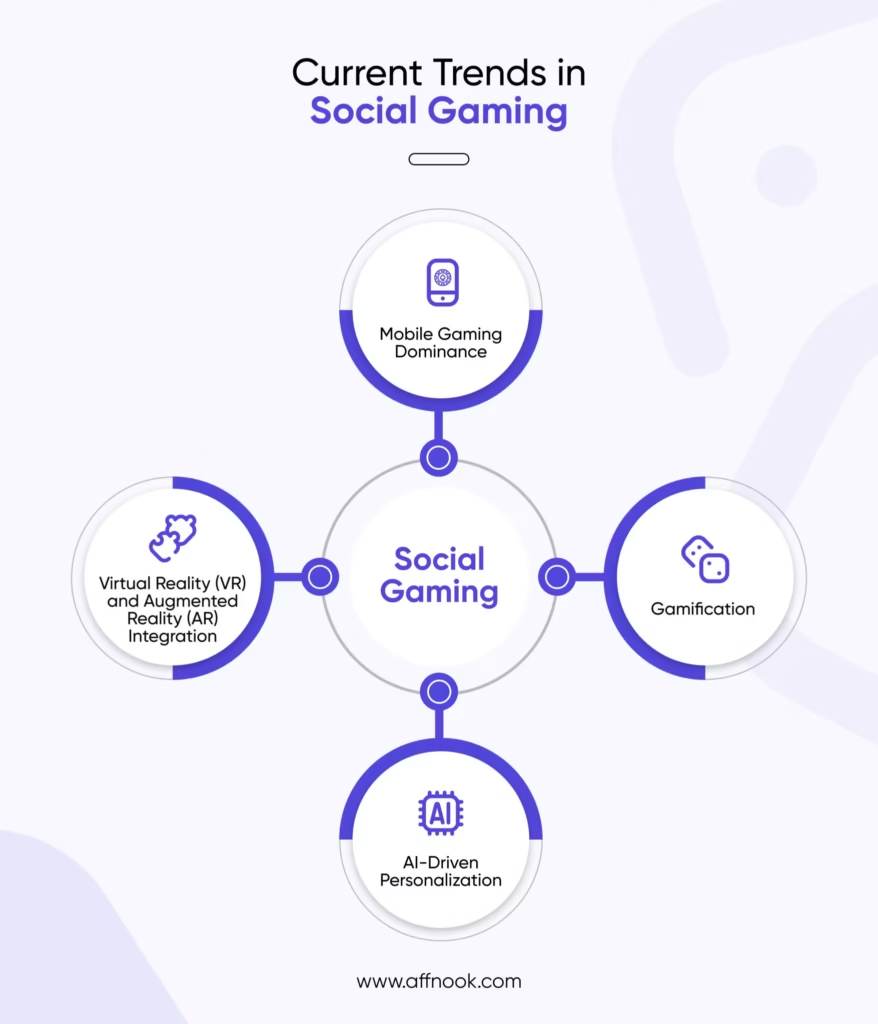
Social Gaming Platforms and Apps
Some popular platforms for social gaming include:
- Facebook: This application has become very popular among people for engaging in content and games. It has integrated games that players like to play to earn points and rewards. There are billions of people who are actively using Facebook to play these types of games. For example, FarmVille, Mafia Wars, and Poker are some of the oldest social games.
- Twitch: It’s mainly a streaming platform, but allows viewers to interact with streamers of influencers through features like chat and polls. This creates more engagement among players. Twitch is just not a place to watch performers, but a platform where viewers can directly interact with players.
- Steam: It is known as a huge library of PC games, but it also serves as a social hub. Players can interact with friends and share game content like screenshots or guides with each other. Steam has a number of features like groups, forums, and event-tracking that make it easy for players to engage and collaborate.
As for social gaming apps, here are some popular examples:
- Pokémon GO: It is a fun mobile game where you catch Pokémon in the real world using your phone. You explore your surroundings to find different Pokémon, battle in gyms, and team up with other players for special events. Over 600 million downloads worldwide since its launch in 2016, and approximately 70 million monthly active players as of 2023
- Clash Royale: This is a multiplayer battle game having social features like clans and high-level tournaments. It provides real-time data to players for better performance.
- Fortnite: It is a popular app that offers a social experience with cross-platform capabilities, allowing you to play games, participate in live events, and enjoy social interaction features.
Social Gaming and Gambling: Are They Linked?
Social gaming and gambling are often closely linked, but they are very different from each other in terms of the experience they offer. Social gaming is all about fun and connecting people without any actual monetary investment. Games like Candy Crush are the perfect example of social games through which players can engage with each other for a long time.
On the other hand, if we talk about gambling, it focuses on betting money on unpredictable outcomes. Players bet real money to earn more rewards, which contain high risks. Games like poker and casino-based games are the best examples of gambling.
But, in today’s digital world, social gaming has slightly become a gambling game. In these games, you can play with your real money and if you win you will get some rewards against that.
For example, online casinos have social game-like features but you can play and earn real money in them.
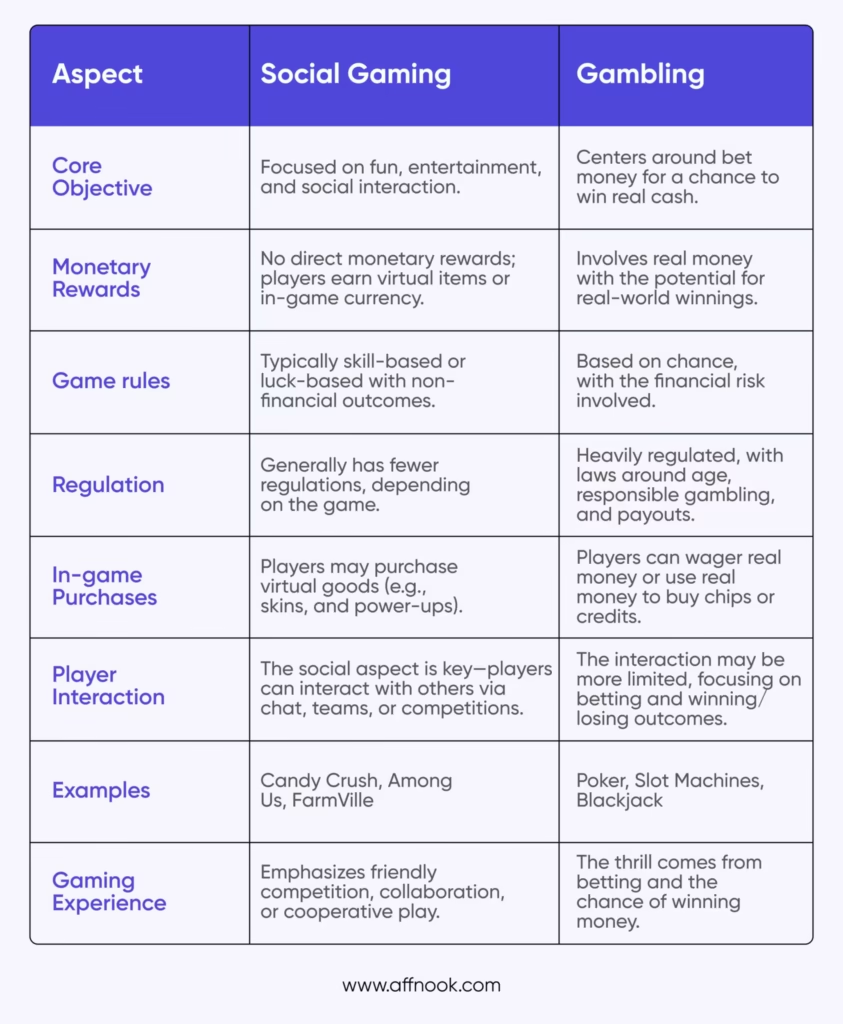
Impact of Social Media on Social Gaming
Social media plays a key role in the growth of social gaming, shaping how games are played and how players interact with each other. Here are some of the main ways social media has impacted social gaming
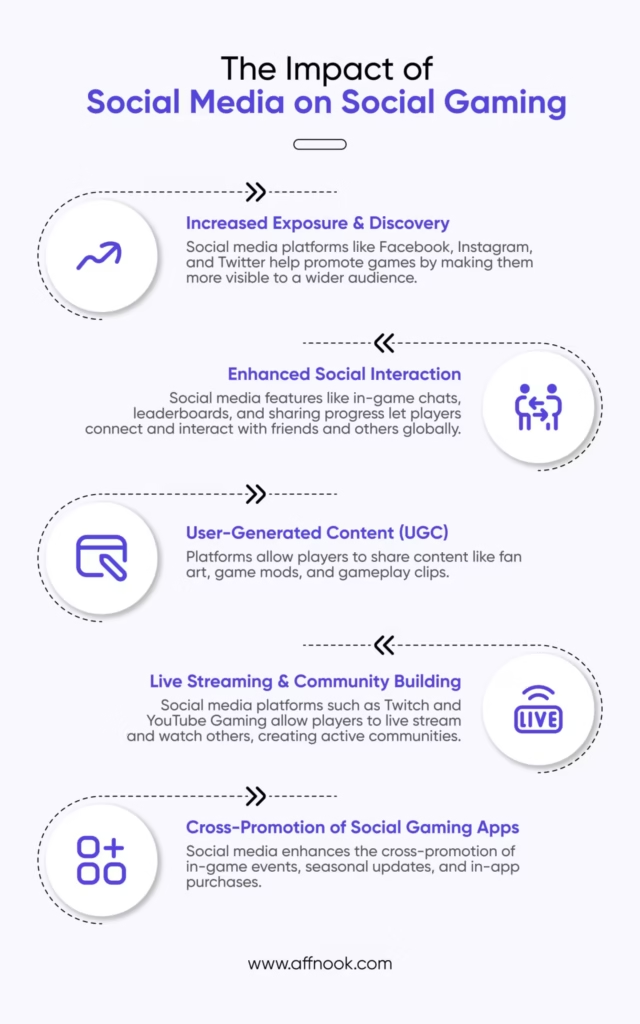
Summing Up
Social gaming has transformed into a popular and exciting way to have fun, attracting millions of players from around the world. It has created a unique environment where people can connect and collaborate in real time. With the rise of mobile gaming, the integration of AR/VR, and AI-driven personalization, the gaming experience has become more interactive and engaging.
Social gaming offers a platform for everyone to showcase their skills. As technology is growing much faster, the future of social gaming is brighter and more personalized. It’s not just about only playing games it’s about building communities and sharing the moments. Social gaming is no longer just a trend.
Help Section
What is social gaming, and how does it differ from online gambling?
Social gaming refers to digital games played online with social interaction features, often free-to-play and monetized through in-game purchases. Unlike online gambling, social gaming typically does not involve wagering real money for financial return. Instead, players compete for virtual rewards, badges, or social recognition, making it more about entertainment and community than profit.
Why is social gaming becoming so popular among iGaming operators?
Social gaming is growing because it helps iGaming operators:
- Build player communities through interactive features like chat rooms and leaderboards
- Increase engagement and retention without direct wagering
- Attract younger demographics who value fun and social connection over monetary gain
- Test new formats and mechanics before introducing them into real-money gaming
This trend allows operators to diversify their audience and strengthen brand loyalty.
What are the latest trends in social gaming?
Some of the key social gaming trends include:
- Cross-platform play between mobile, web, and console
- In-game purchases and microtransactions as the main revenue stream
- Live social casino games that simulate real-world casino environments
- Integration of AR/VR features for immersive experiences
- Esports-style competitions within social gaming apps
These trends are reshaping how players interact with games and how operators monetize them.
How do social gaming platforms generate revenue without real-money gambling?
Social gaming platforms use several models, including:
- Microtransactions: Selling in-game items like coins, skins, or upgrades
- Advertising: Running targeted ads within the game environment
- Freemium models: Free play with paid premium features or subscriptions
- Cross-promotions: Partnering with iGaming brands for exposure
This allows operators to profit while maintaining compliance in markets where online gambling is restricted.
What are the regulatory considerations around social gaming?
While social gaming does not typically fall under gambling regulation, it still faces scrutiny in some regions due to:
- Loot boxes and virtual items that resemble gambling mechanics
- Consumer protection issues around in-game spending, especially for minors
- Data privacy and transparency concerns with large user bases
For iGaming operators, staying informed on regional guidelines and promoting responsible play is key to maintaining trust and compliance.
